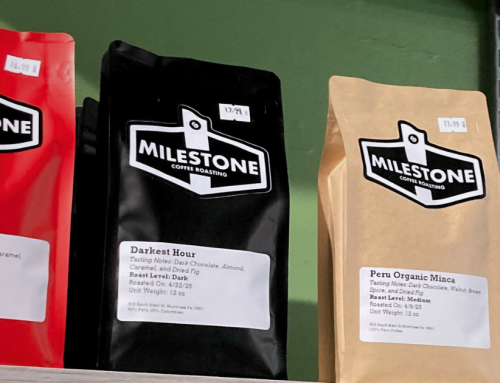The majority of Americans consume coffee – some more than others. Coffee is one of the few substances we habitually consume on a daily basis. Some people even say they can’t live without it. With that kind of consistent intake, you might start looking around for reasons to justify your consumption. Fortunately for you (and by you, we also mean us), there are lots of studies out there that show that drinking coffee has many health benefits beyond boosting energy levels and helping you tackle the day.
The science surrounding the health benefits of coffee has done a 180 over the past few decades. Although the World Health Organization once included coffee on a list of possible carcinogens in 1991, it’s now associated with a decreased risk of certain cancers and diseases.
In short, by drinking coffee, you may be doing your mind and body a favor. But there is more to it than simply attributing the health benefits to how much caffeine there is in coffee. Here are our top ten health benefits backed by peer-reviewed research from institutions around the world you can share when someone tries to question your habits as you reach for your fifth cup of coffee of the day.

Drinking Coffee | Img izzetugutmen, Getty Images
What are the health benefits of drinking coffee?
Studying coffee can be complicated – it’s made up of over one thousand chemicals and compounds, including caffeine, magnesium, polyphenols, and more. According to nutrition experts from the Johns Hopkins University School of Medicine, coffee is full of antioxidants and other substances that can aid in reducing inflammation and protecting against disease.
Some of the health benefits of coffee include:
1. More energy
This might be the main reason most of us drink coffee. There are many health benefits of caffeine, but the most obvious one is its impact on how we feel. Caffeine blocks adenosine receptors in the brain and signals your body to increase levels of other neurotransmitters like dopamine to regulate your energy levels. That’s how coffee can increase productivity and lengthen the time it takes for you to feel tired during an activity like cycling.
2. Weight management
In a related application, research shows that people who drink coffee regularly are more likely to meet the recommended levels of physical activity. That, coupled with coffee’s potential ability to alter the body’s fat storage resulting in decreased body fat in men and women, makes coffee a highly beneficial supplement to weight management.

Espresso with crema and coffee beans | Img Oleksandr Prokopenko
3. Longer Life
In a large study that followed over 200,000 participants for over 30 years, researchers found an association between drinking 3 to 5 cups of coffee per day and a longer lifespan. In addition, they credited compounds found in both caffeinated and decaffeinated coffee with reducing inflammation and insulin resistance, which led to a decrease in the development of diseases.
The participants who drank coffee regularly were 15% less likely to die early from all causes, including cardiovascular disease, suicide, and Parkinson’s disease, compared to non-drinkers.
4. Reduced the risk of colon cancer
The American Cancer Society (ACS) did a study on over 107,000 participants to evaluate the link between drinking coffee and colon cancer. They found that those who drank 2 or more cups of coffee had a lower risk of death from colorectal cancer compared to non-drinkers. That risk was even lower if they regularly drank decaffeinated coffee.
5. Lower risk of developing Type 2 Diabetes
By drinking 6 cups of coffee a day, you may be able to lower your risk of type 2 diabetes by as much as 33%. In this study published in the Diabetes Journals, researchers proposed a link between compounds found in coffee, a reduction in insulin resistance, and improvements in glucose metabolism. Additionally, the lowered risk of type 2 diabetes is associated with drinking both caffeinated and decaffeinated coffee.

Baristas pulling espresso shots | Img filadendron, Getty Images Signature
6. Lower risk of heart disease and stroke
Drinking coffee is generally associated with increased heart rate and palpitations. However, for people who are not sensitive to caffeine, research shows that drinking coffee regularly lowers the risk of heart disease and stroke in the long run – particularly when drinking filtered coffee instead of unfiltered coffee like French press and Turkish coffee.
Some examples include women who drink 4 or more cups being associated with a 20% lowered risk of stroke and women who drink 2-3 cups daily being associated with a 21% decreased risk of heart disease. Similarly, in other meta-analyses of other studies, men and women who drank 3-5 cups of coffee a day were linked to a 15–21% lowered risk of cardiovascular disease.
7. Reduce the risk of Parkinson’s disease
While many of the health benefits of drinking coffee are associated with plant compounds found in the beverage, studies show a link between caffeine intake and a significantly reduced risk of developing Parkinson’s disease. Up to a 58% reduction, in fact, in this study that followed men and women for 10 and 16 years, respectively.
Low dopamine levels are mainly responsible for Parkinson’s disease. In animal and cell studies, researchers found that caffeine in coffee helps protect cells in the brain that produce dopamine.
8. Prevent gallstones
Gallstones are commonly made of cholesterol. Coffee can help stimulate contractions in the gallbladder, thus preventing cholesterol from forming into crystals and turning into gallstones. Studies show that men and women who drank caffeinated coffee for 10 and 20 years had a lower likelihood of developing gallstones.

Coffee farmer presenting green coffee | Img Juan Jose Napuri
9. Lower risk of skin cancer
In a study published by the Journal of the National Cancer that followed over 447,000 people for over 10 years, researchers found a correlation between people who drank 4 or more cups of coffee a day and a reduction in the risk of developing melanoma. Compared to people who drank decaffeinated coffee or non-drinkers, coffee drinkers were 20% less likely to develop skin cancer.
10. Reduce damage caused by free radicals
One polyphenol in coffee is chlorogenic acid, an antioxidant linked to a wide range of health benefits, including anti-diabetic, anti-carcinogenic, anti-inflammatory, and anti-obesity impacts.
As the body generates free radicals as a byproduct of transforming food into energy, these free radicals damage other cells by taking electrons from them and altering their structure. Antioxidants work by donating electrons to free radicals and lowering the oxidative stress levels in our bodies that can go on to damage cells and cause diseases.
Does putting salt in coffee have health benefits?
Salt is a flavor enhancer that can bring out the sweetness in strong coffee while reducing the overall bitterness. That’s why many cultures have enjoyed coffee with a pinch of salt for decades, especially when they’re drinking robustas and dark-roasted coffee. Salt might even be better for reducing bitterness in coffee than sugar.
While most people add salt to coffee for flavor benefits, there may also be some health benefits associated with the practice. In an animal study on caffeine and sodium loss, researchers found a link between habitual caffeine intake and increased sodium loss in rats. Adding back a bit of salt in your coffee can help offset that loss and replenish your sodium levels.
How healthy is coffee?
There’s a lot of evidence out there to say that drinking (the right amount of) coffee is good for you. But it’s not just the caffeine that has positive health benefits. It’s also the many plant compounds found in both caffeinated and decaffeinated coffee that help with reducing the risk of chronic diseases and cancers.
The studies above mostly agree that a standard coffee habit of 3 to 5 cups per day can have beneficial effects on our long-term health. So, consider that the green light to continue enjoying your daily coffees. It’s for your own good!






